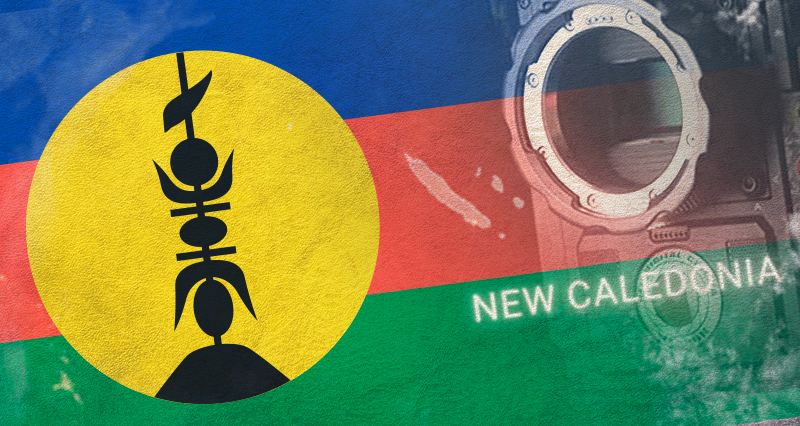By Tunca Arslan
New Caledonia, a former French colony and currently an autonomous region in the Overseas Territories Community located in the South Pacific, remains unsettled. Despite the declaration of a state of emergency, pro-independence protests that began on May 13 continue unabated on the island 17,000 kilometers away from France. The French media have intriguingly blamed Azerbaijan, Türkiye, China and Russia for the independence movement in New Caledonia, while French Interior Minister Gerald Darmanin explicitly accused Azerbaijan of interfering in New Caledonia’s internal affairs.
In short, after Mali, Burkina Faso, Niger and the Central African Republic in Africa, France is also in a tight spot in New Caledonia which takes 48 hours to travel to from Paris by plane. The indigenous people of the island, the Kanaks, continue their resistance with the slogan “Let’s break free from the shackles of colonial authorities”. President Macron’s 12-hour visit to the country yielded no results. It is worth noting that approximately 40 years ago, in 1985, François Mitterrand had made a similar 12-hour visit in response to similar events on the island and had also yielded no results. Mitterrand had said, “The thread we feared might have broken is mended; the path to dialogue is open” but could not get rid of the problems caused by New Caledonia.
Mathieu Kassovitz foretold
Today’s protests, sparked by the French government’s proposal to grant voting rights to French citizens who have lived on the island for 10 years as part of a constitutional reform, have reignited the flames of independence in the country which had been annexed in 1853. New Caledonians want to decide their own future. France sent 600 more soldiers to restore order in the country. The developments on the island inevitably recall Mathieu Kassovitz’s 2011 movie “L’Ordre et la Morale,” which is essential to understanding what is now going on.
Kassovitz made a tough appearance into the cinema world with his 1995 film “La Haine,” which mirrored social class differences and racism in the Paris ghettos. The “L’Ordre et la Morale”, directed and starred in by Kassovitz, recounts the 1988 military operation known as “Operation Victor” in New Caledonia, where France had to deploy troops for the first time in its history since the Algerian War.
Different methods of politicians, military and CIGN
In the movie, France sends 600 soldiers to New Caledonia to suppress the independence movements and rescue 30 French gendarmes taken hostage. Captain Philippe Legorjus, played by Mathieu Kassovitz, is on the island with his men as a member of the French National Gendarmerie’s counterterrorism and special operations unit, CIGN. Knowing that no army has ever won against guerrillas, the captain disagrees with the French government officials and the military on the methods of rescuing the hostages. This is just before the presidential election in France. Politicians and generals have other agendas, and France is simultaneously dealing with a similar crisis in Lebanon. Alphonse Dianou, the indigenous leader of the independence insurgents holding the hostages, refuses to back down: “I am rebelling against the world’s third-largest army.” He is in contact with the pro-independence alliance, the Kanak and Socialist National Liberation Front (FLNKS) and is unwilling to release the hostages without being certain of the political consequences. Captain Legorjus starts negotiation talks with Alphonse Dianou and goes to the cave where the hostages are held. Upon realizing that the politicians are determined to launch a military operation even at the cost of sacrificing the hostages, Captain Legorjus accelerates the negotiations. However, as he states, the outcome comes out to be “We have all been betrayed!” and the military initiates “Operation Victor” resulting in the death of many.
Stolen land for nickel
The words of Alphonse Dianou to Captain Legorjus in the cave summarize both the movie and the New Caledonia issue: “All these deaths are for the nickel that covers the mountains. Without it, you wouldn’t even know we existed. Your ancestors stole the red soil for a pack of cigarettes and a bottle of alcohol. You ravaged our country for nickel, polluted our air and sea. You injected your poison to capture the mines we have. Your money, drugs, alcohol… After you turn the world into money, not to live but to have more, we will be the survivors of your apocalypse”.
Addressing the audience’s feelings and thoughts on who is a terrorist and who is a freedom and democracy advocate, Kassovitz effectively exposes the lingering ghost of colonialism that France still clings to in “L’Ordre et la Morale”. We are, in fact, watching the “same movie” today! The social democrat Mitterrand, who won against the right-wing Chirac in the 1988 elections and took office for the second time, failed to solve the New Caledonia issue. We will see what Macron, who continues to ravage this beautiful island for nickel, will achieve in this test. It is certain that New Caledonia remembers the events of 1988 and the movie “L’Ordre et la Morale”.

















Leave a Reply